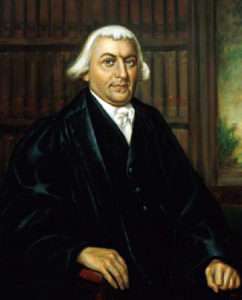The Volokh Conspiracy
Mostly law professors | Sometimes contrarian | Often libertarian | Always independent
Today in Supreme Court History: May 12, 1790
5/12/1790: Justice James Iredell takes the judicial oath.

Editor's Note: We invite comments and request that they be civil and on-topic. We do not moderate or assume any responsibility for comments, which are owned by the readers who post them. Comments do not represent the views of Reason.com or Reason Foundation. We reserve the right to delete any comment for any reason at any time. Comments may only be edited within 5 minutes of posting. Report abuses.
Please to post comments


From his opinion in Calder: “If, on the other hand, the legislature of the Union or the legislature of any member of the Union shall pass a law within the general scope of its constitutional power, the court cannot pronounce it to be void merely because it is in its judgment contrary to the principles of natural justice.”
So lonely here without Capt. Dan.
James Iredell notably was a supporter of the Constitution from North Carolina, which only ratified the document November 21, 1789, a half year after the first Congress had met.
He was the lone dissenter in Chisholm v. Georgia, the ruling that led to the Eleventh Amendment. He also had this polite way of answering stupid arguments in Hylton v. U.S.:
"I should have thought this merely an exercise of ingenuity if it had not been pressed with some earnestness, and as this was done by gentlemen of high respectability in their possession, it deserves a serious answer, though it is very difficult to give such a one."
One historical summary basically said SCOTUS killed him:
"Worn down by his occupation’s demands, Iredell died on October 20, 1799, at the age of forty-eight."
Ah. An early American martyr to the rule of law.
https://northcarolinahistory.org/encyclopedia/james-iredell-sr-1751-1799/
Riding circuit was tough.
From captcrisis.com
Rhode Island v. Innis, 446 U.S. 291 (decided May 12, 1980): Armed robbery defendant locked in back of police car, after being given Miranda warnings, overheard officers in front talking about the danger of gun being picked up by children from nearby school for the mentally disabled; he piped up and told them where it was. This statement was admissible despite Miranda because there was no “interrogation” going on. (I’ve been to that neighborhood, Mount Pleasant in Providence. It’s working class, semi-attached triple-decker houses. My in-laws live there. Providence in general is a unique and interesting place. There is indeed a school there for disabled children, Harold A. Birch School. The concern as to a disabled child picking up the gun was legitimate, but it still sounds like a “gotcha!”.)
Reno v. Bossier Parish School Board, 520 U.S. 471 (decided May 12, 1997): preclearance of proposed redistricting (§5 of the Voting Rights Act) is not necessarily denied if there is intentional vote dilution (§2) because purpose of §5 is to prevent retrogression to earlier discrimination (§5 is a dead letter now that §4(b) was invalidated in Shelby County v. Holder, 2013)
Hill v. Stone, 421 U.S. 289 (decided May 12, 1975): denial of Equal Protection to restrict voting on city bond issue to those who would directly bear the resulting tax increase (i.e., property owners); this was for new library, not a “special interest” election (where the franchise can be restricted appropriately)
Johnson v. United States, 520 U.S. 461 (decided May 12, 1997): materiality of defendant’s false statement to grand jury (i.e., source of box of cash which she knew was really the proceeds of drug trafficking) should have been question for jury in perjury trial but harmless error because evidence of materiality was “overwhelming”
Bugajewitz v. Adams, 228 U.S. 585 (decided May 12, 1913): determination that petitioner had entered country to practice prostitution and therefore would be deported did not require evidence of conviction of prostitution in home country
Johnson v. Mississippi, 421 U.S. 213 (decided May 12, 1975): defendants arrested under state anti-boycott law (they were boycotting whites-only businesses) did not allege sufficient civil rights violations justifying removal under 28 U.S.C. §1443(1)
Gonzalez v. United States, 553 U.S. 242 (decided May 12, 2008): consent of counsel, and not of his client, sufficed to allow magistrate (and not judge) to preside over jury selection in felony case
Cuyler v. Sullivan, 446 U.S. 335 (decided May 12, 1980): murder defendant sharing counsel with other defendants was entitled to Fourteenth Amendment protections in state criminal trial, but under Sixth Amendment Right to Assistance of Counsel trial court must inquire only into any actual (not potential) conflicts of interest between defendants